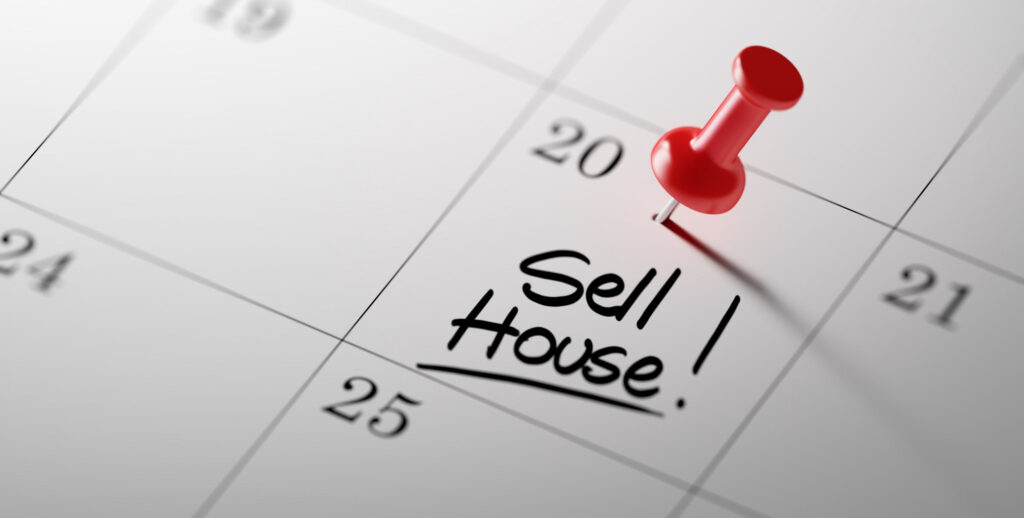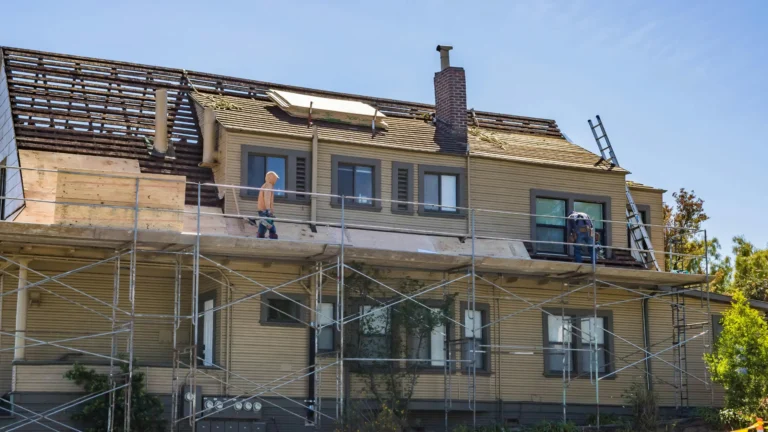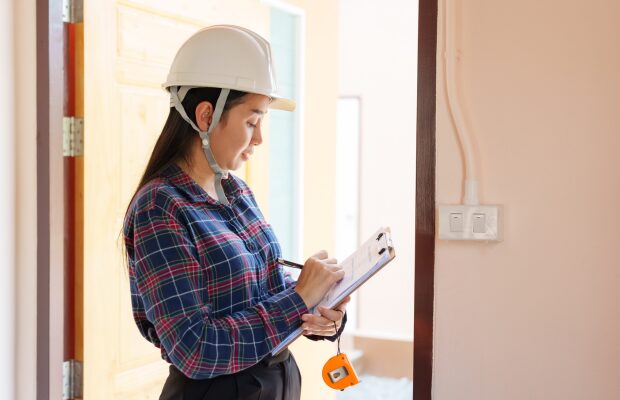Selling your home is a huge and emotional decision and can be extremely daunting.
But understanding the process of selling and making sure you’re as prepared as you can be can really help ease the stress.
In this guide, we outline all the steps you’ll need to go through when you move, helping you to prepare for each stage of your journey, speeding up the process.
Thinking of moving? Book a free valuation now.
What is the average time to sell a house in London?
The average time to sell a house in London is between 16 and 20 weeks.
In the rest of the UK, Rightmove’s house price index suggests it’s taking sellers a little under eight weeks (or 55 days) to secure a buyer.
On average, it then takes a further 10-12 weeks (or 85 days) to move from the offer stage, through the legal process and to exchange of contracts.
How do I begin selling my house?
Preparing to sell your home requires a lot of up-front planning and consideration.
These are the steps you can expect when selling your house:
1. Decide if selling is the right decision
Selling your home is a huge decision, so it’s important to make sure you’re doing so for the right reasons and have a clear plan.
You’ll need to think about:
- Why you’re moving – do you need more space, or are you downsizing?
- The current market – is it a good time to be selling and are homes like yours in demand?
- Finances – can you afford to move and cover all the costs associated with moving?
- Renting – would your home be popular with renters? If so, it may be worth keeping as an investment rather than selling
The time of year should also come into your thinking when deciding whether to sell.
As a rule, spring is a great time to sell because:
- The weather is warming up and buyers emerge from a winter hibernation
- The evenings are lighter, meaning more time in the day to view properties
- A 12-to-16-week process to complete a sale will get families into a new home before the summer holidays begin
Another good time to sell can be autumn:
- The late summer weather tends to hold into September and early October
- Buyers ramp up their bid to be in a new property before Christmas
- Children are back at school in September, meaning parents have more time to view homes
On the other side of the coin, winter and summer generally see a slight slowdown in the property market:
- School holidays mean many families go away for a break
- Warm weather sees buyers spending time doing other fun things besides looking for a new house!
- In winter, darker evenings limit the time to view a house in good light conditions
- The fast approach of Christmas means many buyers wait until the New Year to start their property search
How to speed this up?
Bring in the experts! Book a professional valuation with Ellis & Co and we’ll help you to decide whether now is the right time to market your property.
2. Get your home valued
Before selling, it’s important to know what your property is worth in the current market.
This can help you decide if selling is the right step.
An instant online valuation
can give you an excellent initial idea of what your home is worth.
But the best way to find out the current market value of your home is by inviting local estate agents to give your property a thorough market appraisal.
The agents will look at your property and any improvements you’ve made, which will then be factored into their detailed valuations.
Once you have your valuations, you can then decide what asking price you set for your property.
How to speed this up?
Ellis & Co are quick off the mark with booking your valuation. Speak to your local branch and they’ll help you to find a time that suits you.
3. Find the right estate agent
Have your property valued by at least four estate agents and take some time to carefully consider the valuations that come back.
While the lowest figure might net you a quicker sale, the numbers might not work for you and your plans.
Consider each agent on its merits and speak to friends and family about their own experiences of your local agents, as well as looking at online reviews.
Ensure you ask each estate agent who values your home a series of key questions, including:
- What fees do you charge?
- What is your commission rate?
- What kinds of sale contract do you offer?
- What experience do you have of selling homes like mine in the area?
- How will my property be marketed?
- Will you carry out viewings yourself?
Book a valuation with Ellis & Co
4. Get your documentation in order
To legally sell your house, you’ll need to have certain documentation. Failure to produce these can lead to unnecessary delays to your sale so to keep things moving along nicely, make sure you have copies of the following:
A valid Energy Performance Certificate
For your property to be listed as ‘for sale’ it must have a valid Energy Performance Certificate (EPC).
An EPC shows how energy efficient your home is and is valid for 10 years.
If you don’t have an EPC, or your previous certificate has expired, your estate agent should be able to help you arrange a new assessment.
Identification
Your solicitor will need proof of your identity through:
- A valid photo driving licence, or
- A valid passport
They’ll also require proof of your address, which can be a recent utility bill or council tax statement.
Property title deeds
Your solicitor should obtain your property’s title deeds from the Land Registry, but if your property hasn’t been sold since 1990, you may have to provide them yourself.
Property registration only become mandatory in 1990 and if the Land Registry doesn’t have a copy of your deeds, you’ll need to provide them to prove you are the legal owner of your home.
Leasehold information pack
If your home is leasehold, you’ll need to provide your solicitor with a leasehold information pack.
This should be available from your freeholder and explains the terms of your property’s lease to a potential buyer, including any ground rent or service charges.
Fixtures and fittings and property information forms
Once you’ve found a buyer and accepted their offer, you’ll need to complete a TA10 form which details what fixtures and fittings will be included with your sale.
You’ll also need to complete a TA6 form alongside any certificates you have for things like windows or builder warranties.
Once completed, the TA6 form includes details on:
- Boundaries
- Neighbour disputes
- Planning permissions
- Insurance costs
- Flood risk and energy performance
- Parking
- Utilities and services, including the condition of wiring and heating systems
5. Organise your finances and costs
Being financially well organised is key to eliminating a lot of the stress than can come with selling your home.
If you’re selling because your plan is to buy a new home and you require a mortgage, you’ll need to make sure your finances are in good order.
You should:
- Look at your credit score and file and correct anything that’s not right, including ensuring you’re on the electoral roll
- Close any old or inactive bank or credit accounts
- Avoid applying for credit before you move
As well as looking at your financial situation, you should also start to factor in the associated costs that come with selling:
When selling your property, some of the costs you’ll need to consider include:
Estate agent fees
Most high street agents will charge you a percentage commission related to your property’s sale price, usually between 1% and 3%.
This is usually on a no sale, no fee basis.
Tax when selling property
If you’re selling a property that’s been your main home since you bought it, you won’t have to pay capital gains tax.
However, if you’ve previously rented out the property, capital gains tax may apply and will be calculated based on the amount of time it wasn’t your main home.
Our capital gains tax guide explains everything you need to know.
If you’re selling so you can buy a new home, you’ll also need to factor in stamp duty.
Solicitor fees
When selling your home, you’ll need a solicitor or conveyancer to complete the legal side of your sale.
Solicitor fees vary, so make sure you shop around and seek recommendations.
As well as your solicitor’s main fee, you may also have to pay a series of smaller fees, known as disbursements.
Many disbursements cover costs paid up front by your solicitor for things like local authority and environmental searches if you’re buying another property.
Other fees and charges if you’re buying
If you plan to buy a new home once your current property is sold, you’ll need to consider several other costs, including:
- Mortgage costs, including a mortgage valuation fee and arrangement fee
- Survey costs
- Removals fees
How to speed this up?
Create a budget to cover these expenses, making sure you have a healthy contingency fund to cover any unexpected bills.
6. What happens to your mortgage?
If you have a mortgage on your current property, you may be able to move the outstanding amount to a new home, known as ‘porting’.
Porting your mortgage means you get to keep the same terms and rate, but not all lenders offer this.
If you’re unable to port, or you don’t require a mortgage for your next property, your existing mortgage will be redeemed when you sell your home.
Early Repayment Charges (ERCs)
Before selling, check to see if your current mortgage comes with any early redemption charges (ERCs).
ERCs are usually calculated as a percentage of your outstanding mortgage balance and taper off as you move through your current deal.
For example, if you have a five-year fixed rate with ERCs, the percentage penalty you pay if you move in year five will be much less than if you were to move in year one.
How to speed this up?
Book an appointment with a mortgage broker who will be able to offer advice on the kind of mortgage that will suit you.
7. Choose a solicitor
Once you have chosen an estate agent and set your asking price, it’s time to engage a solicitor to deal with your property sale.
As with an estate agent, speak to several firms or independent conveyancers before deciding and seek recommendations from family and friends as well as checking out online reviews.
Solicitors are key cogs in the property sale wheel and choosing a proactive one can really help move your sale along quickly.
How to speed this up?
Speak to your local branch to find out about the conveyancing firms in your area that they recommend.
8. Prepare your house for sale
Making sure your home is ready for the sales market is crucial and that means thinking about what your potential buyer will want from your home and showing it in its best light.
Ask yourself who your home will appeal to. Perhaps that would be a professional couple looking for more space to start a family, or maybe you are moving from an apartment that would suit a single buyer.
Think about how your home will work for the person you are trying to attract and stage it in such a way.
For example, if you are using a bedroom as an office, but are looking for a buyer who needs space for their growing family, consider turning your work hub back into a bedroom.
Most of all, though, keep your property tidy and free of clutter and allow your buyers to visualise themselves living there.
It’s important your property makes an immediate positive impression on buyers, too, so ensure its exterior is presented as well as its interior.
What not to fix when selling your house
While decorating your property to make it look its best can be a great way to impress buyers, you should think carefully about undertaking major repairs that will cost you money before you sell.
Your estate agent will be able to advise you but taking on major upgrades like replacing kitchen counters or flooring may end up costing you money that you won’t get back through a higher sale price.
Instead, focus on addressing issues that could put off buyers, such as:
- Poor cleanliness or smells
- An old or broken boiler
- Clutter and junk
- Old electrics or poor wiring
- Mould and damp
9. Consider offers on your property
Once you start receiving offers from potential buyers, it’s easy to be reactive and either accept or decline instantly.
Regardless of those initial feelings, it’s important to consider each and every offer on its merits.
Think again about your needs and how the market is performing.
If the market is slow and you can take your next step by accepting a lower offer, you should consider it.
Alternatively, don’t feel railroaded into accepting an offer well below what you believe your property to be worth in the current market.
At this stage, advice from your estate agent can be key so listen to what they have to say.
But remember, you are in control and the final decision lies with you.
Once you accept an offer, your agent will let the buyer know and the process of the sale will begin.
10. Check the progression of your sale
Once you’ve accepted an offer on your property, you’ll enter the conveyancing phase of your sale.
Conveyancing can take on average between 10 and 12 weeks and during this time your solicitor will:
- Request a mortgage settlement from your lender
- Obtain legal documents from the Land Registry, including your property’s title deeds
- Need you to complete the TA10 and TA6 information forms
- Prepare a draft contract outlining the details of your sale
- Answer, along with you, any enquiries raised by the buyer’s solicitor
- Liaise with you and agree a completion date with your buyer
- Request that you sign your side of the contract
- Exchange contracts with your buyer’s solicitor
- Pay off your mortgage and take their fee from the proceeds of your sale and forward any remaining balance to you
11. Exchange of contracts
Once you’ve agreed a completion date and your solicitor has completed much of their conveyancing work, you’ll be ready to exchange contracts with your buyer.
Exchange of contracts makes your sale legally binding.
Your solicitor will usually exchange contracts with your buyer’s solicitor over the phone, which involves them reading out the contracts to ensure they’re identical.
They’ll then send the signed contracts to each other right away by post.
12. Completion of your sale
On your completion day, your solicitor will:
- Request a redemption certificate from your mortgage lender, which will calculate your outstanding mortgage balance up until the day
- Create a completion statement detailing all payments made and received
- Receive the buyer’s purchase payment and ensure estate agent fees are paid and your mortgage is redeemed
- Confirm all money as paid so your estate agent can release the keys to your buyer
Further reading…
- How to prepare your home for sales photography
- The most valuable home improvements you can make
- How to sell a Shared Ownership property
Speak with your local property experts for guidance and assistance on selling your home: speak to Ellis & Co








